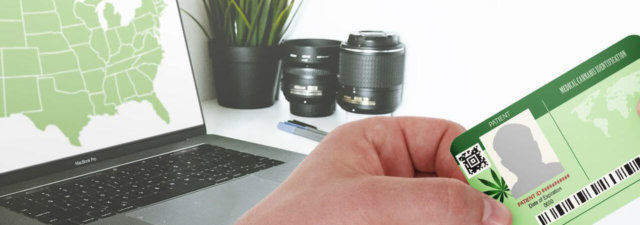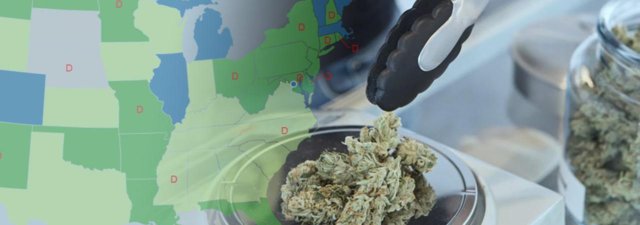Unfortunately, you can forget about getting an NC Medical Card because the state doesn’t have a medical marijuana program.
In 1977, North Carolina effectively decriminalized the possession of up to half an ounce of weed, with the penalty reduced to a small fine.
Since then, however, attempts to legalize MMJ have failed. Until recently, there was virtually no progress in these efforts either. A medical marijuana bill introduced in May 2014 made it as far as the House Committee in March 2015, where it died.
Until 2022, nothing significant happened in the field of MMJ, but Senate Bill 711 could change everything. Also, it may soon become possible to purchase medical marijuana within the confines of the Qualla Boundary.
This article investigates what would happen if SB 711 became law, outlining the process for MMJ patients and discussing the bill’s provisions. It also provides more detail on the fascinating development in The Qualla.
North Carolina Medical Marijuana Laws
In North Carolina, being caught with less than half an ounce is a misdemeanor but only carries a fine of $200 with no prison time involved. However, if found with between 0.5 and 1.5 ounces, you could spend up to 45 days in jail. Furthermore, possessing over 1.5 ounces is a felony with a possible eight months of imprisonment.

The sale of any amount of weed is a felony that carries a jail term of 4–8 months. Incarceration of up to 39 months applies if found selling 10+ pounds of marijuana. The cultivation of any amount of weed is also a felony, with 3–8 months in a jail cell the likely outcome.
Soon, there may be a way to get MMJ in North Carolina, and we will outline it later. First, though, let’s learn more about how residents can get medical marijuana if the current bill makes it into law.
How to Get a Medical Marijuana Card in North Carolina
The passing of the Compassionate Care Act in the North Carolina Senate could finally legalize medical marijuana. Certainly, SB 711, in its current form, is restrictive compared to many other MMJ programs in the United States. Nonetheless, if it were to pass, it would represent a gargantuan step in the right direction as far as marijuana advocates are concerned.
This guide outlines what we know about SB 711. We begin by briefly outlining what the MMJ card application process might look like based on what has happened in other states with legal medicinal cannabis.
Step 1 – Get in Touch with an NC Healthcare Provider
The first step on the journey to MMJ in North Carolina is to get in touch with a physician licensed to practice within the state. According to SB 711, doctors looking to prescribe MMJ would need to complete a special 10-hour course before receiving certification.
Step 2 – Schedule a Consultation
As doctors need extra qualifications to provide MMJ approval, patients may find it hard to get an appointment at first. Once it is time for the consultation, you would need to bring your medical records and discuss your potential usage of medical marijuana with the doctor. They will only approve individuals who have a qualifying medical condition, in their opinion. Also, the doctor won’t offer approval unless they believe the benefits of MMJ outweigh the risks.
If approved, patients will receive certification from the doctor, which is necessary to apply for the MMJ card. The doctor will also determine the delivery method of the marijuana and the amount that constitutes a 30-day supply.
Step 3 – Register with the Official NC Medical Marijuana Program
If a patient receives approval, they must register with the North Carolina Department of Human Health and Services (DHHS). Then they would need to complete the application online and wait for the Department to approve.
Step 4 – Visit a Dispensary
After receiving an MMJ card in the mail, patients would be free to buy weed from one of the state’s licensed dispensaries.
Who Can Apply for a Medical Marijuana Card in NC?
To apply for a medical marijuana card in NC, you would need to be 18+ and a state resident.
Cost of MMJ Card in NC
It is unclear what the medical marijuana card cost in NC would be. However, SB 711 caps the price at $50. Patients could expect to pay between $150 and $250 for the doctor’s consultation.
NC MMJ Card Qualifying Conditions
There are relatively few NC medical marijuana card qualifying conditions as per SB 711. They include:
- Cancer
- Epilepsy
- HIV/AIDS
- Multiple sclerosis
- Parkinson’s disease
- PTSD (in some cases)
- Sickle cell anemia
- ALS
- Crohn’s disease
- Cachexia or wasting syndrome
- Severe or persistent nausea that’s related to hospice or end-of-life care
The Medical Cannabis Advisory Board created by SB 711 would have the power to add further medical conditions to the list.
How Long Does It Take to Get a Medical Marijuana Card in NC?
SB 711 says the state’s DHHS must review applications and approve/deny them within 45 days of receipt. Once the DHHS approves an application, it must send the registry ID card to the applicant within 14 business days.
How to Renew My North Carolina Medical Card?
The North Carolina MMJ card would be valid for one year. At this stage, patients would need to reapply by receiving certification from a licensed physician again. The DHHS must approve or deny a renewal within 45 days of receiving the application.
Other Information on the NC Medical Marijuana License Process
The following includes information on the provisions of SB 711 as it stands. However, even if it is passed into law, the version of the bill that creates an MMJ program may be different from the current form.
What Types of Cannabis Can I Purchase in NC?
According to SB 711, medical marijuana cardholders could buy smokable marijuana; they would also be permitted to vape the substance.
How to Get a Medical Marijuana Card in NC Online
It is unlikely that the North Carolina medical marijuana program would permit online doctor’s consultations initially.
Can I Register My Child for Medical Marijuana in NC?
The Compassionate Care Act allows minors to use MMJ via a non-inhalation method with the consent and care of a parent or legal guardian.
Where Can I Purchase MMJ in North Carolina?
If the bill passes into law, it will create a system with licensed marijuana producers, distributors, and two regulatory boards. North Carolina would create a Medical Cannabis Production Commission to issue ten supplier licenses. Each licensee would be permitted to open four dispensaries. In theory, this means NC could have up to 40 MMJ dispensaries.
How Much Cannabis Can I Buy & Possess?
The bill would permit MMJ patients to possess a 30-day supply as determined by their doctors.
Can You Grow Marijuana in North Carolina with a Medical Marijuana Card?
There is no indication that SB 711 would allow MMJ cardholders to grow marijuana at home.
Where Can I Use My MMJ?
As with MMJ programs in other states, cardholders can only consume their medicine in a private residence.
Can I Take My MMJ to a Different State?
No. It is illegal to bring marijuana across state lines as it is a federally prohibited substance. Also, whether the NC medical marijuana program would allow reciprocity is unknown.
What Are the Caregiver Rules?
The Compassionate Care Act states that MMJ patients can have caregivers. However, such individuals must be 21+ unless they are the parent/legal guardian of the qualifying patient. MMJ patients may name a maximum of two caregivers. Once approved, caregivers will receive a registry ID card.
What If I Lose My Medical Card in North Carolina?
There is no clear instruction on what patients should do if they lose an MMJ card. However, they will likely need to contact the state’s DHHS for assistance.
When Will Medical Marijuana in North Carolina Become Legal?
At present, it is impossible to say. Little progress has been made in recent legislative sessions, despite the majority of NC residents being in favor of MMJ legalization.
There is a suggestion that MMJ could become legal in North Carolina at some point in 2024, although that seems a long shot at present. The state’s Senate has actually passed the Compassionate Care Act. However, despite several often tense hearings, the House has yet to vote.
For medical marijuana to become legal in NC, the bill must pass in the House and be signed by the state governor. There remains significant opposition to the bill, and it is unlikely to receive approval in its current form.
Furthermore, a competing MMJ bill, Senate Bill 448, may stop the Compassionate Care Act from passing in the House. In June 2022, the North Carolina House voted in favor of SB 448, which legalizes prescription drugs containing marijuana and THC if they are FDA-approved. Governor Roy Cooper signed SB 448 into law six days after the House approved it.
The FDA has only approved a single cannabis-derived drug and three cannabis-related drugs.
How to Get a Medical Marijuana Card in Charlotte
As the Charlotte metro area comprises one-quarter of the population, residents can expect numerous MMJ dispensaries to open if SB 711 is passed into law.
MMJ Card for Veterans in NC
Many veterans in North Carolina are excited at the prospect of medical marijuana becoming legal. PTSD is a qualifying condition if the patient can show evidence that they experienced at least one traumatic event, such as an issue suffered while on active military service.
A Startling Development Has Changed Everything
A situation unique to North Carolina has unfolded. In 2021, the Eastern Band of Cherokee Indians (EBCI) authorized the creation of a medical marijuana program. The following year, the EBCI cultivated, harvested, and processed cannabis in North Carolina.
The group first began discussing legalized marijuana in 2015. Six years later, the tribe decriminalized possession of small amounts of cannabis and legalized MMJ. After founding an LLC called Qualla Enterprise, the EBCI began fundraising and raised a staggering sum of money.
Things were proceeding smoothly until May 2023. Then, the EBCI withdrew its backing of a $64 million loan to support the MMJ program one month after a Tribal Council approved it. However, it now seems likely that MMJ sales will begin in April 2024. The EBCI is still debating whether to permit recreational marijuana sales.
Here’s What We Know About the ECBI Marijuana Program
Initially, sales will be open to tribe members and eligible MMJ patients. At a later stage, North Carolina residents aged 21+ may be allowed to purchase MMJ within the Qualla Boundary. In case you’re wondering, the Qualla Boundary is a sovereign nation, so it can create its own laws.
To buy MMJ from the EBCI, you must share your medical records, have a government-issued ID, and have proof of residency. A five-member board will decide if you qualify, and there is a list of qualifying conditions. These may include PTSD, glaucoma, cancer, and epilepsy. When applying via the EBCI’s Cannabis Control Board, you must pay a fee of $100. This is reduced to $50 for EBCI members.
Only one dispensary will sell MMJ, and it is located in an old tribal bingo building. Qualla Enterprises may open a second dispensary at some point.
The maximum limit per daily purchase is an ounce of marijuana or 2,500mg of THC products. The monthly limit is 10,000mg of THC products or six ounces of marijuana. They are among the most generous limits of any MMJ program in the United States. These limits will be reviewed and potentially modified once the program is underway.
The main issue revolves around where you can use it. Assuming marijuana remains illegal in the rest of North Carolina, you can’t take it with you outside of the Qualla Boundary. Yet, it will be unlawful for you to use it in public, in schools, community centers or tribal facilities. It seems as if you may need to adhere to hotel rules for in-room use. Presumably, there will be a particular location where users can consume marijuana.
Also, the tribe is likely to accept out-of-state MMJ cardholders. Incidentally, the Qualla Boundary is located around 45-50 miles from Asheville.
Final Thoughts on Getting a North Carolina Medical Marijuana Card
While Senate Bill 711 gives hope to prospective medical marijuana patients in North Carolina, it faces stiff opposition. A definitive decision may happen relatively soon. At this point, we’ll know whether MMJ is legal in North Carolina or if residents must wait at least another year.
Realistically, it seems unlikely that the House will approve the legislation. Instead, SB 446 is in play and only allows the use of FDA-approved cannabis products, of which there are few.
Ultimately, individuals seeking MMJ in NC will likely have to wait for the substance to be legalized. Alternatively, they can travel to the Qualla Boundary once the EBCI starts selling medical marijuana.













